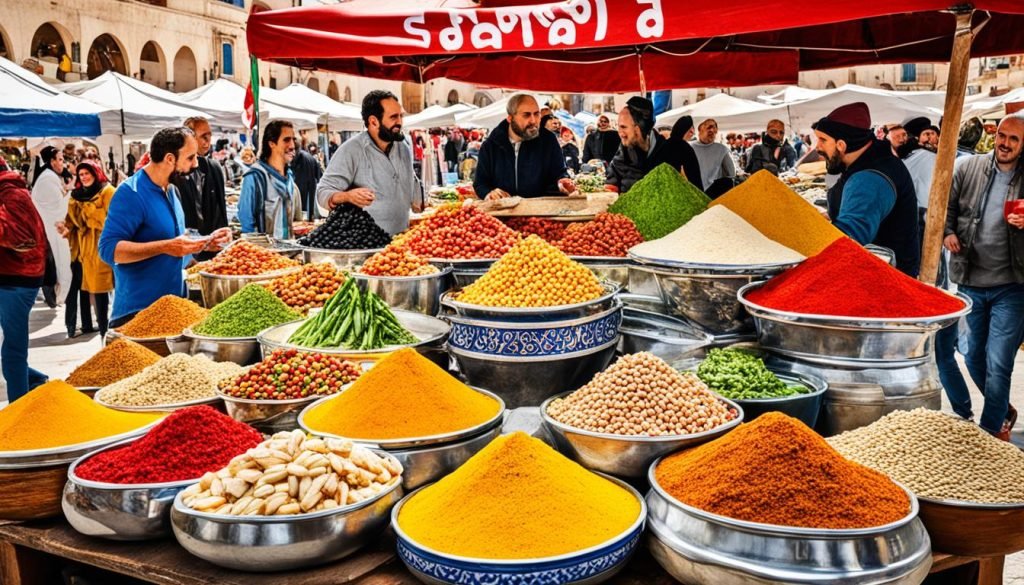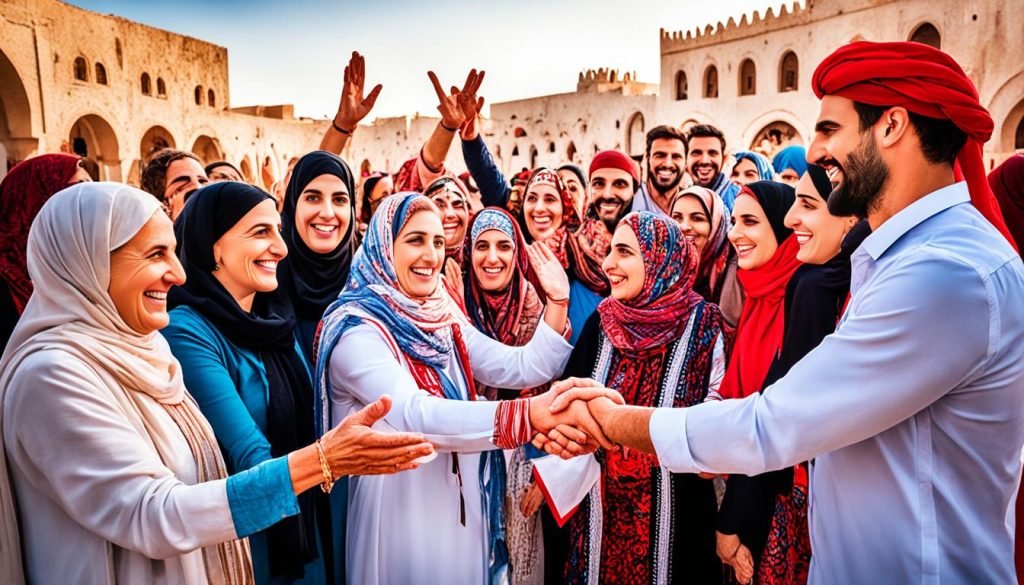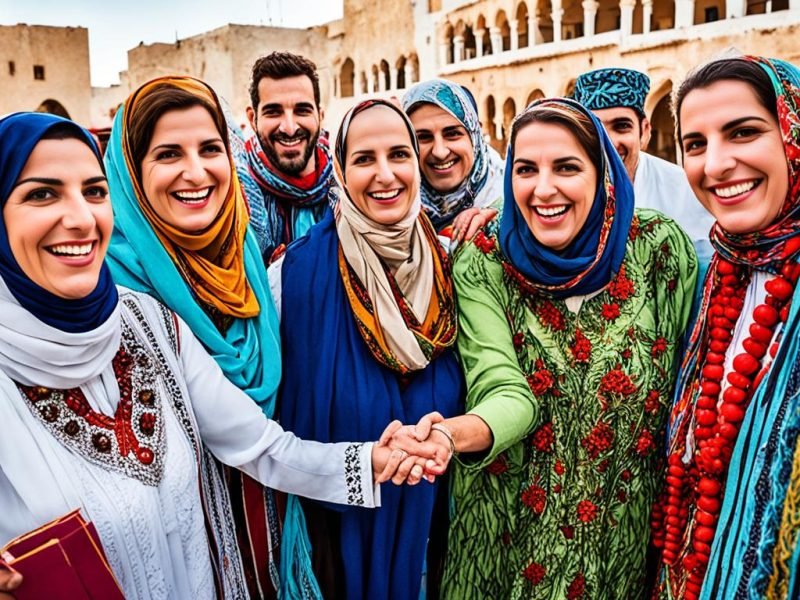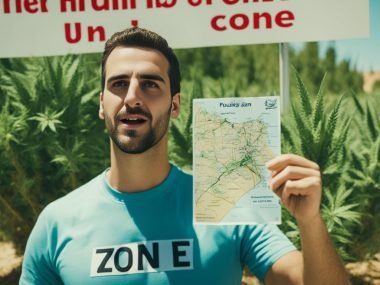As I walked through Tunisia’s busy medinas, I saw beautiful mosaics. The smell of jasmine was everywhere. I heard many languages. Yet, “Chnahwelek?” stood out the most. I wanted to know more about Tunisian greetings.
I learned how Tunisian salutations can make friends out of strangers. Every “Chnahwelek?” was warm like the Tunisian sun. Conversational Tunisian showed me the soul of the place is in its language.
In Tunisia, knowing some Tunisian Language Basics makes your trip special. It turns a visit into a deep cultural journey. By speaking Derja, you connect deeply with locals. In Tunisia, saying hello is sharing a piece of your life.
Key Takeaways
- Discover the genuine Tunisian greeting “Chnahwelek?” and its cultural significance.
- Understand how Tunisian salutations reflect both Arabic and French influences.
- Learn the basics of conversational Tunisian to enhance your interactions.
- Gain insight into the pronunciation and application of key Tunisian phrases.
- Embrace the importance of cultural exchange through Tunisian language basics.
Decoding the Tunisian Greeting: Chnahwelek?
On my journey through Tunisia, I often heard Chnahwelek? It’s everywhere. In busy markets and quiet towns. This greeting is more than a “How are you?” in Tunisia. It’s a sign of politeness and friendliness.
Understanding Tunisian Salutations
Using Chnahwelek? makes you closer to Tunisians. It’s key to show you care and respect them. This phrase helps in bonding with the local people.
The Significance of Greetings in Tunisian Culture
Greetings in Tunisia celebrate social connections. Chnahwelek? means “How is your condition?”. It starts real, caring chats. It shows how Tunisians value their community.
Audio Pronunciation Guide for Chnahwelek
It’s important to pronounce Chnahwelek correctly. This way, you avoid misunderstandings. And it shows you respect their language’s subtleties.
| Tunisian Phrase | English Translation | Context of Use |
|---|---|---|
| Chnahwelek? | How are you? | Used in informal and semi-formal settings |
| Labes? | All good? | Casual, often among friends |
| Shkounnek? | How have you been? | Reconnecting after a long time |
A Brief Introduction to Tunisian Phrases
When you visit Tunisia, you will love its language. Tunisian Arabic is special and has a long history. It helps you talk and connect with locals. Learning basic phrases is key for anyone wanting to really experience the country.
If you go beyond just ‘hello’ and ‘goodbye,’ your trip will be better. Using Tunisian Arabic for simple things makes people happy. It helps you make friends and learn more about their way of life.

Saying “Yaishek” to thank someone is nice. Saying “Ay” for yes and “Le” for no is useful. These words help you fit in and get smiles from people. Tunisian cultural communication is important. It turns every word you speak into something special.
| English Phrase | Tunisian Arabic Translation | Useful Context |
|---|---|---|
| Thank you | Yaishek | Gratitude after receiving a service or gift |
| Yes | Ay | Affirmative response to a question |
| No | Le | Negative response to a question |
Basic Tunisian Language skills mean a lot. They show respect for the culture and its people. Speaking the language adds depth to every experience. It helps you in markets or when eating with new friends. Learning Tunisian Arabic turns language barriers into bridges between cultures.
Interactive Tunisian Language Basics
Learning Tunisian Arabic is more than just grammar and vocab. It means diving into real conversations. Using simple phrases helps you connect during your travels.
Commonly Used Tunisian Arabic Words and Phrases
- Aslema – Hello
- Bislema – Goodbye
- Shnowa issmik? – What is your name?
- Attini… – Give me…
Knowing these basics shows respect for the local culture. It’s a great way to feel more involved and make friends.
Learning Tunisian Arabic Through Immersion
Real skill comes from necessity and practice. There’s no better practice than talking with people. Whether it’s with a taxi driver or at the market, every chat helps.
Every conversation teaches you more about Tunisia. It makes you feel part of the community, even if just for a while.
Whether starting out or improving, every phrase you learn brings you closer to Tunisian life. It’s about experiences that mean more than words can say.
How to Say Hello in Tunisia
Mastering Tunisian Greetings is key when visiting Tunisia. You might be walking through Tunis or enjoying the Sahara. Knowing how to say hello in Tunisia starts your cultural journey. Tunisian Salutations like “Sbe7 lkhir” (good morning) and “Masa2 Sa3id” (good afternoon) build bonds with locals.

Saying “Aslema,” which means hello, shows you respect their ways. This opens doors to friendly talks. From my travels, this respect makes your trip better and builds understanding.
| English Phrase | Tunisian Arabic Translation | When to Use |
|---|---|---|
| Good morning | Sbe7 lkhir | Early morning greeting |
| Good afternoon | Masa2 Sa3id | Afternoon greeting |
| Hello | Aslema | General greeting, any time of day |
These key phrases in Tunisian Greetings symbolize Tunisian warmth. By using them, you dive into the local culture. This leads to unforgettable memories and stories from your visit.
Tunisian Cultural Communication: Beyond Simple Hellos
Tunisian cultural communication is a deep mix of languages. This blend comes from the country’s diverse history. It combines Tunisian language basics with French, creating a unique way to say hello.
The Role of French and Arabic in Tunisian Greetings
Conversations in Tunisia do more than just share words. They build cultural connections. French phrases like “Ça va?” mix with Arabic’s “Chnahwelek?”. This shows how two languages work together in Tunisia.
This mix reflects Tunisia’s history with France. It’s seen in everyday talks. Both languages are key for communication here.
Examples of Tunisian Salutations in Context
Knowing how and when to use Tunisian greetings helps communicate better. Let’s see how these greetings change through the day:
| Time of Day | Greeting in Arabic | Greeting in French |
|---|---|---|
| Morning | Sabah el kheir | Bonjour |
| Afternoon | Masa’ el kheir | Bon après-midi |
| Evening | Masa’ el noor | Bonne soirée |
Greetings are key in Tunisian culture. They show the time of day and respect. Mixing Tunisian and French makes communication smoother and deepens cultural understanding.
Tips for Conversational Tunisian When Traveling
Traveling through Tunisia is better when you try speaking the local language. Knowing a few phrases shows respect and can make your trip better. As someone who loves languages and traveling, I find knowing Tunisian phrases very handy. They help a lot every day, from chatting with people to buying things.
Conversational Tunisian is great for making new friends. It helps whether you’re shopping or looking for places in Tunis. Learning a few key phrases can really change your travel experience.
I’ve put together a list of important phrases for travelers using Tunisian Arabic guidance. These phrases are great for many situations, like eating out or haggling in markets.
- Ordering Food: “Se’il vous plaît, je voudrais…” (Please, I would like…). This is a polite way to start ordering food.
- Shopping: “Chhal hadha?” (How much is this?). It’s crucial for finding out prices and negotiating.
- Asking for Directions: “Feen el…?” (Where is the…?). It’s always helpful for finding places.
- Expressing Satisfaction: “Barcha helu!” (Very delicious!). Use this to say how much you enjoyed the food.
Here’s a quick guide with translations and simple phrases to remember. It has greetings, daily essentials, and polite replies. Learning these Tunisian Phrases for Traveling can lead to easier conversations:
| English | Tunisian Arabic |
|---|---|
| Hello/Goodbye | Aslema/Bislema |
| Thank you | Yaishek |
| Yes/No | Ay/Le |
| How much? | Chhal hadha? |
| This is very good! | Hada barcha helu! |
Before you go, learn a few phrases from Tunisian Arabic guidance. It makes daily activities easier and your trip more fun. Trying to speak Tunisian is always appreciated. It can lead to fun adventures and new friends.
Embracing Tunisian Hospitality Through Language
Traveling through Tunisia, the local Arabic unlocks genuine hospitality. Learning this language is entering into the heart of their culture. Saying “Labes, humdullah” to “Chnahwelek?” shows you cherish their culture and kindness.
How to Respond to Chnahwelek
Tunisian hospitality is a dance of nice words. In markets or cafes, “Chnahwelek?” lets me show my happiness. Answering “Labes, humdullah,” brings smiles and welcomes from locals. It’s a sign of acceptance and cultural understanding.
Building Connections with Tunisian Locals
Learning Tunisian dialect has shown me true connection. Observing and responding like locals has given me an insider’s view. Every word and phrase I learn helps me bond with the people here.
This warm hospitality invites me to join their community. As I learn and share, every meeting paints a memory of Tunisia.







